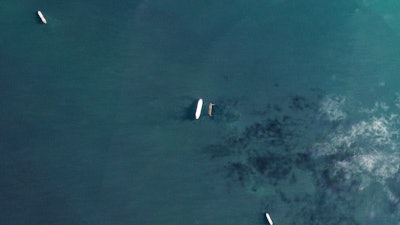
DUBAI, United Arab Emirates (AP) — An oil tanker owned by a major U.S.-traded transportation company appears to be taking on Iranian crude oil in a key Asian maritime strait in violation of American sanctions, an advocacy group alleges. The firm allegedly involved, Euronav, said Wednesday it will "take appropriate action when necessary."
Satellite photos and maritime tracking data analyzed by The Associated Press put the Belgian-flagged crude oil tanker Oceania just next to the Vietnamese-flagged tanker Abyss for a possible ship-to-ship transfer. The group United Against Nuclear Iran has warned the Oceania's owner, the Antwerp-based Euronav, that it believes the Abyss took on Iranian crude oil in late February.
The suspicion comes as Iran remains able to trade its crude oil at sea despite American sanctions snapping back into place after then-President Donald Trump unilaterally withdrew the U.S. from Tehran's nuclear deal with world powers in 2018. Now nearly five years later, Iran enriches uranium closer than ever to weapons-grade levels while continuing to sell its oil and supplying bomb-carrying drones to Russia to fuel Moscow's war on Ukraine.
Brian Gallagher, a spokesman for Euronav, told the AP in a statement that the company "has and always has taken all the appropriate measures and protocols to ensure we are in compliance with all regulations."
"All cargoes within our system have passed these requirements," Gallagher wrote. "Euronav will continue to monitor any specific shipments and take appropriate action where necessary."
Gallagher said the Oceania was a storage vessel and the cargo from the Abyss was for "a third party NOT directly with Euronav." He added if the allegation the oil is Iranian is proven, "the cargo will be returned to the third party who delivered it."
Euronav trades on the New York Stock Exchange.
The Abyss' manager did not immediately respond to requests for comment Wednesday.
Satellite images from Planet Labs PBC and data from the ships' Automatic Identification System trackers put the vessels Tuesday and Wednesday in the Malacca Strait, one of the world's busiest waterways between Indonesia and Malaysia. In an image Tuesday, tug boats were pushing the Abyss toward the Oceania.
Tracking data from MarineTraffic.com showed the vessels alongside each other Wednesday. At sea, oil tankers can funnel crude between each other in a ship-to-ship transfer that typically sees boats in a similar position.
In a letter dated Tuesday to Euronav, United Against Nuclear Iran said it believed the Abyss took on crude oil at the Iranian port of Bandar Mashahr, some 600 kilometer (370 miles) southwest of the capital, Tehran, on the Persian Gulf. The Abyss had turned off its AIS tracker on Feb. 18 as it was pointed toward Bandar Mashahr.
 In this satellite photo by Planet Labs PBC, an oil tanker that the group United Against Nuclear Iran believes is the Abyss is docked at Bandar Mashahr, Iran, Feb. 22, 2023.Planet Labs PBC via AP
In this satellite photo by Planet Labs PBC, an oil tanker that the group United Against Nuclear Iran believes is the Abyss is docked at Bandar Mashahr, Iran, Feb. 22, 2023.Planet Labs PBC via AP
Ships are supposed to keep their AIS trackers on for safety reason, but vessels believed to be carrying Iranian crude oil routinely turn theirs off to mask their movements over the international sanctions Tehran faces.
A ship corresponding to the Abyss' size and features could be seen docked at Bandar Mashahr on Feb. 22 in a satellite photo analyzed by the AP. United Against Nuclear Iran said it found a satellite image it believed showed the Abyss at the port in the same position the day before.
"Any other signs of manipulating AIS transponders should be considered red flags for potential illicit activity," the New York-based group said in its letter signed by Mark Wallace, a former U.S. ambassador to the United Nations.
The Abyss is managed by Ho Chi Minh City-based PetroVietnam Transportation. Vietnamese vessels have been suspected of smuggling Iranian crude oil in the past. Smugglers typically misidentify where the crude oil they carry came from in order to skirt suspicions.
Iran's mission to the United Nations and the U.S. Treasury did not immediately respond to requests for comment.
This isn't the first time a U.S.-linked firm has been associated with an Iranian oil transfer at sea. In February 2022, United Against Nuclear Iran warned Los Angeles-based private equity firm Oaktree Capital Management that it believed a tanker the firm owned took on Iranian crude oil.
The U.S. government has said illicit Iranian oil revenue funds the paramilitary Revolutionary Guard's Quds Force, an expeditionary unit believed to be working abroad in countries like Iraq, Lebanon, Syria and Yemen to back Iranian-allied militias.






















